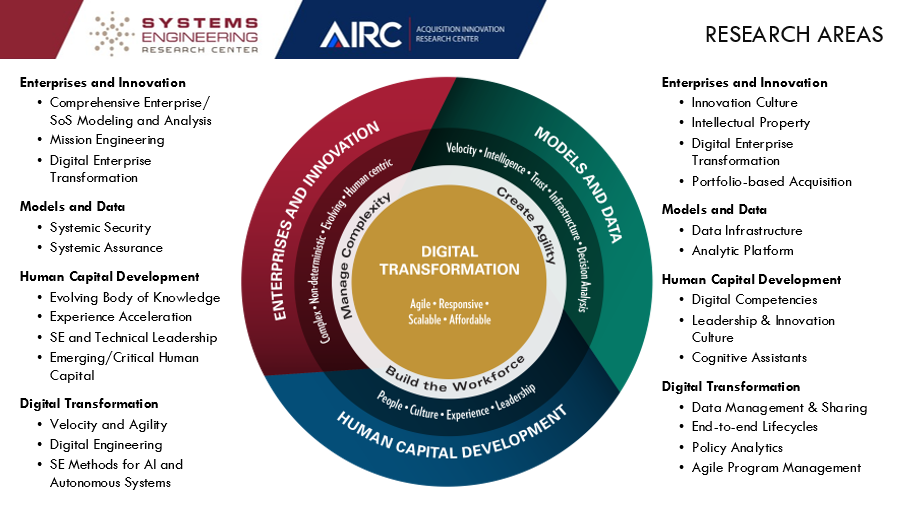Leveraging a Network of Expertise to Enhance Innovation for the DoD

On October 12, 2022, the White House released the National Security Strategy, which seeks to define the challenges facing the nation. Cited on the U.S. DoD news site, National Security Advisor Jake Sullivan, speaking of national security in the context of the global climate change crisis and COVID-19, states, “The strategy …offers a road map for seizing this decisive decade to advance America’s vital interests, position America and our allies to outpace our competitors, and build broad coalitions to tackle shared challenges.”
The Systems Engineering Research Center (SERC) and Acquisition Innovation Research Center (AIRC), networks of national academic expertise, are part of that broad coalition. SERC, a University Affiliated Research Center for the Department of Defense, and AIRC, are delivering portfolios of research that encompass the areas in Figure 1. On a national level, the network is delivering high-level analyses and fundamental research to Services and agencies within the DoD, with a focus on digital transformation of the defense acquisition ecosystem and transitioning advances to operators in the field.

The 2022 Annual Research Review for SERC and AIRC will be held as a hybrid event November 15-17 at the National Press Club in Washington DC. This event unites a national network of defense practitioners and researchers across government, industry, and academia to discuss issues of national and global significance. Researchers will present research addressing the most challenging issues facing the Department of Defense and other federal departments and agencies.
Background
In an article exploring the question of whether systems engineering needs to be modernized it is noted that, “Systems engineering has been integral to defense acquisition since the late 1960s, and systems engineering principles and methods were adopted by the DoD in the late 1960s/early 1970s as a way to manage technical and programmatic development and risk across the engineering and management components of large complex weapon systems. Systems engineering has been a foundation of DoD acquisition policy since it was formally defined as a system itself”.
SERC research is conducted across the Services, the defense industrial base, and academia, and research use is steadily growing. The US Marine Corps (USMC) is leveraging SERC-developed tools for tradespace analysis and systems portfolio analysis; the Navy is adopting SERC model-based systems engineering techniques; the Air Force is applying SERC cost modeling approaches to manage complex systems; both the Army and Defense Acquisition University (DAU) are applying SERC approaches to growing technical leaders; several defense contractors are applying research on how to improve the effectiveness of their systems engineers; and many universities have adopted SERC-developed approaches to weave systems thinking and systems engineering into undergraduate engineering capstone projects.
Impact
Systems engineers tackle problems at scale, providing solutions for issues that arise in complex systems of systems composed of multiple components that may or may not be integrated into a cohesive system that works as intended. Systems engineers also have the skills to solve complex problems as the discipline crosses all areas of the ‘system of interest’, and they also possess a unique capability to share what they know in contexts that are meaningful to those seeking information and solutions.
The research carried out by SERC and AIRC in the Enterprises and Innovation research area provides analytic perspectives on the barriers, challenges, and solutions present in the DoD ecosystem. The thought leadership in these areas is matched with specific research tasks that propose solutions, methods, processes, and tools to overcome the challenges outlined. For example, in The Nature of the Defense Innovation Problem, the researchers cite the need for the DoD to craft the skills and critical thinking necessary for leadership and the workforce in a new reality of rapidly emerging, widely proliferated technology. Many of the SERC and AIRC research studies address this issue; highlights among them include: critical competencies to support digital transformation in acquisition, DoD/defense industry collaboration in STEM education and workforce development, and Agile and DevSecOps applied to Space Force GPS modernization program.
Research in Models and Data creates ways for systems engineers to leverage data and the models that utilize data to enable and inform system objectives. Data is at the core of the future defense enterprise. The infrastructure to support that data is a critical area for research that must leverage both DoD and commercial industry strengths. Current research in this area includes: the Cyber-Physical-Human Testbed to Support Research and Experimentation, the IP Data Repository Study, Management and Business Knowledge Representation for Decision Making, the Design of New Lifecycle Models to Reflect the Flow of Data, and the AIRC’s Defense Data Grand Prix. The latter is a program designed to provide opportunities for faculty-led student teams to bring creative problem solving to data challenges present in the defense acquisition ecosystem.
The Human Capital Development area features research that identifies the skills required by the workforce as well as ways to improve those skills. AIRC and the Defense Acquisition University (DAU) are jointly holding a series of Quarterly Research Forums where researchers present relevant research and receive feedback from faculty and practitioners in the field, while also providing DAU with expert views on its curricula initiatives and challenges. The Capstone Marketplace is developing the next generation of the defense workforce by bringing project-based systems engineering approaches to real-world problems, delivered in undergraduate courses. The Simulation Training Environment for Digital Engineering (STEDE) is integrating a simulation environment, case studies and system models to help illustrate critical digital engineering learning points.
The studies cited above represent only a few components of the active SERC and AIRC research portfolio. To truly understand the whole ‘system of interest’, the SERC is pushing the boundaries of digital transformation in the field itself. This is represented by the significant research underway on the modernization of systems engineering, it’s applications and organizational challenges; the design of frameworks to measure enterprise-wide digital transformation; and the design of systems for gathering data to support decision making processes. Applications of advanced capabilities such as artificial intelligence (AI) for testing and evaluating systems are co-evolving with systems engineering and the adoption of digital engineering in the defense acquisition ecosystem is generating new ways of thinking about how defense system portfolios are contracted, designed, modeled, tested, produced and delivered.
The DoD’s Digital Engineering Strategy formalizes the role of digital engineering and model-based systems engineering for digital transformation, which is critical in an environment of global challenges, dynamic threats, evolving technologies and increasing life expectancy of systems in operation. The DoD Data Strategy is actively pursuing recent advances in data collection, storage, curation, and sharing—coupled with increased analytic capabilities from data science, machine learning, and AI—allowing for fundamental rethinking of how to organize, execute, and deliver improved and responsive capabilities. Ultimately, the digital transformation of practices and processes has the potential to revolutionize DoD acquisition and sustainment – to improve warfighter capabilities at lower costs and more responsive speeds. The focus of SERC and AIRC research will remain on bringing both digital transformation and innovation to overcome these challenges and sustain these advances.
To learn more about this research, register for the hybrid Annual Research Review (Nov. 15 – 17) where SERC and AIRC researchers will present findings and impact to members of the DoD, defense industry, and academia.
